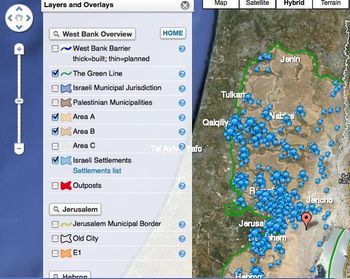HonestReporting's social media editor, Alex Margolin, contributes occasional posts on social media issues. He oversees HonestReporting on Facebook.
Considering the Internet world’s steady shift towards mobile phones and the Apple iPhone’s runaway success with user-generated mobile applications (apps) – software widgets for mobile devices – it was only a matter of time before someone designed an application around the Middle East conflict.
This week, the Americans for Peace Now (APN) launched their “Facts on the Ground” app designed to allow people to track settlement activity through their mobile phones.
The app consists of a map of the West Bank with dots identifying Jewish communities in the region. When a user clicks on a dot, the app shows a wide range of information about the community, including when it was established and how much “private Palestinian land” it takes up.
According to Haaretz, APN believes that the application “democratizes data” about the West Bank to help people who are unable to go on Peace Now’s tours of the region get a grasp of the situation:
APN intends to update the map regularly with new information, such as the establishment and dismantling of outposts, and violent incidents between Palestinians and settlers. Their stated intention is to turn the app into a "comprehensive real-time view of what is happening on the ground in the West Bank."
The app’s appearance raises two important questions.
1. How democratic can app can be when it's created by a group attempting to influence politics in Israel? The timing of the app’s launch – the same week Israel’s West Bank settlement freeze is due to expire – points to APN's political ambitions. While it may strive to provide “facts on the ground,” APN is limited by its own perspective on the issue, which does not represent the consensus opinion in Israel.
2. How will Peace Now’s opponents respond? Wired magazine noted, in its own coverage of the new application, that Israel has a poor record spreading its message through apps.
Most Israel-related apps are mostly touristy projects about finding good restaurants on Dizengoff Street in Tel Aviv. (You can, however, download MyPalestine, a Palestinian heritage app that veers into anti-occupation rhetoric.)
Facts on the Ground represents an early attempt at turning the App Store into contested geopolitical territory. It surely won’t be the last. Don’t be surprised to see apps popping up that show, say, where Hamas rockets fired from Gaza have landed on southern Israeli towns; or the latest anti-Semitic rant from Iranian President Mahmoud Ahmadinejad.
Wired is right: there is plenty of room for Israel’s supporters to use social platforms like iPhone apps to spread their message. But social media is not like the mainstream media. It cannot be pressured to provide balanced coverage of an issue.
That means a response to the APN app will come only if Israel’s supporters take the matter upon themselves.
The issue also reminds us that the Internet provides an open platform, which can be used by both sides of the conflict. Unfortunately, the pro-Israel side is playing catch-up once again instead of taking to lead in the use of progressive technologies.
Previously in Alex's series: Mike Wise's Whale of a Fail


